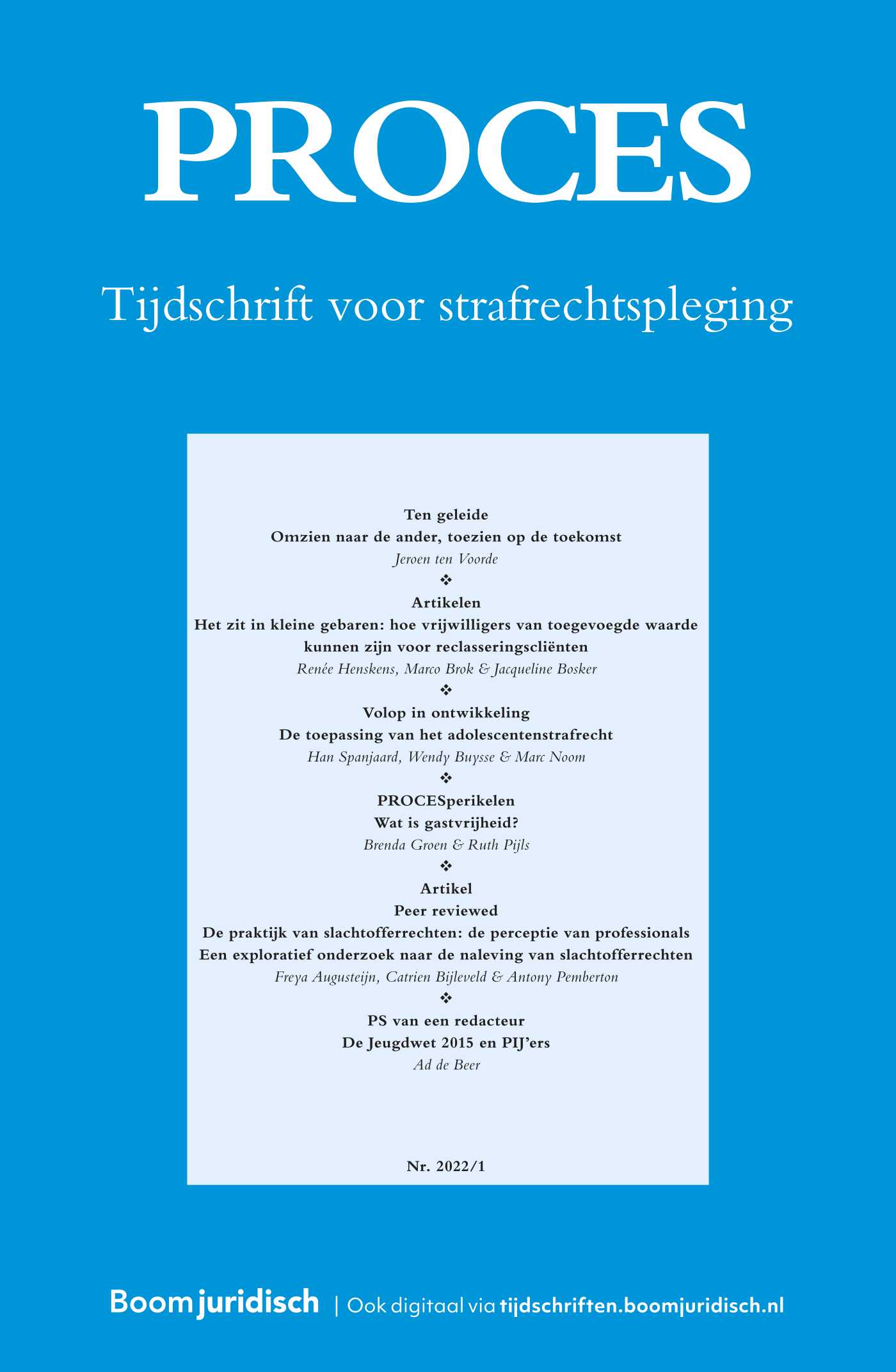|
Increasing digitization and datafication lead to an increasingly important role of data in our society and to changes in the way institutions work and decisions are made. Although it can lead to changes in the type of crime (e.g. cybercrime), datafication also facilitates shifts from visible and registered crime to crime that has not (yet) been measured and registered, like manifestations of organized crime. Analyzing so-called big data can help to recognize new forms of crime, predict risk factors, and decrease the dark number of these forms of crime. |


PROCES
Meer op het gebied van Criminologie en veiligheid
Over dit tijdschriftMeld u zich hier aan voor de attendering op dit tijdschrift zodat u direct een mail ontvangt als er een nieuw digitaal nummer is verschenen en u de artikelen online kunt lezen.
| Ten geleide |
Een computer stapt nooit met het verkeerde been uit bed, maar kan hij ook straffen opleggen? |
| Auteurs | Mr. dr. Sigrid van Wingerden |
| Auteursinformatie |
| Artikel |
|
| Trefwoorden | Georganiseerde criminaliteit Organized crime, Ondermijning Drugs, Datascience Data science, Voorspellende indicatoren Indicators |
| Auteurs | Dr. Patricia Prüfer en Prof. dr. Emile Kolthoff |
| SamenvattingAuteursinformatie |
| Artikel |
Misverstanden over traumaEen illustratie aan de hand van ervaringen van professionals |
| Trefwoorden | Trauma, Professionals |
| Auteurs | Dr. mr. Elisa van Ee en Prof. dr. Janine Janssen |
| SamenvattingAuteursinformatie |
|
Previously we have published an article about misunderstandings regarding trauma and PTSS. In this contribution we deal with other popular beliefs regarding trauma. We focus on trauma among professionals as a consequence of their work. It is explained that a professional does not have to witness violence or another severe case directly in order to develop some form of trauma. Next to that we focus on the misconception that professionals suffering from trauma can receive treatment without support of their loved ones and social network. It is explained that social support is not only relevant but necessary in treating trauma effectively. |
| Artikel |
Bezoek in Nederlandse gevangenissenDe stand van zaken |
| Trefwoorden | Bezoek Visitation, Detentie Imprisonment, Leefklimaat Prison climate, Detentie-ervaringen prison experiences |
| Auteurs | Maria Berghuis MSc, Dr. Hanneke Palmen en Prof. dr. Paul Nieuwbeerta |
| SamenvattingAuteursinformatie |
|
Prison visitation is important for protecting against social isolation during imprisonment. It is also essential for maintaining contacts that are important for life in prison and after release. It is therefore not surprising that both nationally and internationally important policy measures and scientific research have been undertaken on the topic. Nationally, however, limited scientific research is available regarding how many, how often and from whom prisoners receive visits, how visits are experienced and the possible effects of visitation, thus leaving many questions unanswered. Meanwhile, in the past ten years great changes have been made to visitation in Dutch prison policy and practice. Given these recent developments, both scientists and practitioners could benefit from an overview of the current state of affairs of visitation. This article aims to bridge the gap between research, policy and practice by summarizing findings from the Life in Custody study. This study includes a description of how visitation is organized legally, at the policy level and in practice, a thorough review of prior research on visitation and an analysis of the most recent national data on the prevalence and frequency of visitation, while considering important differences between prisoners and prisons. |
| PROCESperikelen |
Werken met vrijwilligers bij Bureau Buitenland |
| Trefwoorden | Reclassering Probation, Bureau Buitenland Bureau Buitenland, Buitenlandse detentie Imprisonment abroad, Vrijwilligers Volunteers |
| Auteurs | Michelle Pape MSw en Marco Brok MSw |
| Auteursinformatie |
| Artikel |
Financiën: een risicofactor voor delictgedrag?Een onderzoek naar de complexiteit van financiële problematiek onder reclasseringscliënten |
| Trefwoorden | financiële problematiek financial problems, Schulden Debts, Delinquentie Delinquency, Reclassering Probation |
| Auteurs | Gercoline van Beek MA, Dr. Vivienne de Vogel en Prof. dr. Dike van de Mheen |
| SamenvattingAuteursinformatie |
|
The relationship between debts and delinquency is still unclear and knowledge about the prevalence and scope of debts among delinquents, which is needed to systematically explore this relationship, is lacking. The present study contains a systematic and scoping literature review on this relationship and analyzed data from risk assessment and client files (N = 250) from the Dutch probation service. Results show that debt and crime are strongly related and that debts among probation clients are highly prevalent and complex and underline the importance of inquiring more knowledge about debts as a potential risk factor for relapse during supervision. |
| Artikel |
Gedetineerd en debiteurOnderzoek naar het hebben van schulden tijdens en na detentie |
| Trefwoorden | Schulden Debts, financiële problemen financial problems, Criminaliteit criminal offending, Detentie Imprisonment |
| Auteurs | Dr. Rosa Koenraadt, Dr. Anja Dirkzwager en Prof. dr. Paul Nieuwbeerta |
| SamenvattingAuteursinformatie |
|
An exceptionally high prevalence of financial debt problems can be found among prisoners, but criminological knowledge on the link between debts and crime is limited. Previous studies are hindered by a lack of information on types of debts, informal debts and background characteristics. This article provides first and detailed insights in the types and amount of debts during and after prison in the Netherlands. Based on data from the Prison Project we show that the majority of prisoners report having debts during prison, show how different types of debts are related and how these debts change six months after release. |
| PS van een redacteur |
De eeuwigdurende twist over (het gebrek aan) moraal en de betaalde liefde |
| Auteurs | Prof. dr. Janine Janssen |
| Auteursinformatie |

